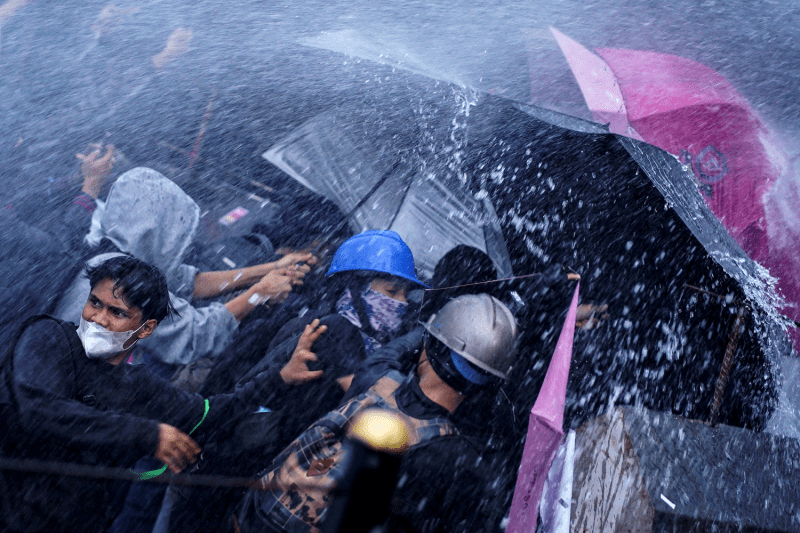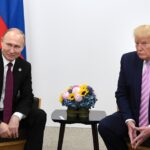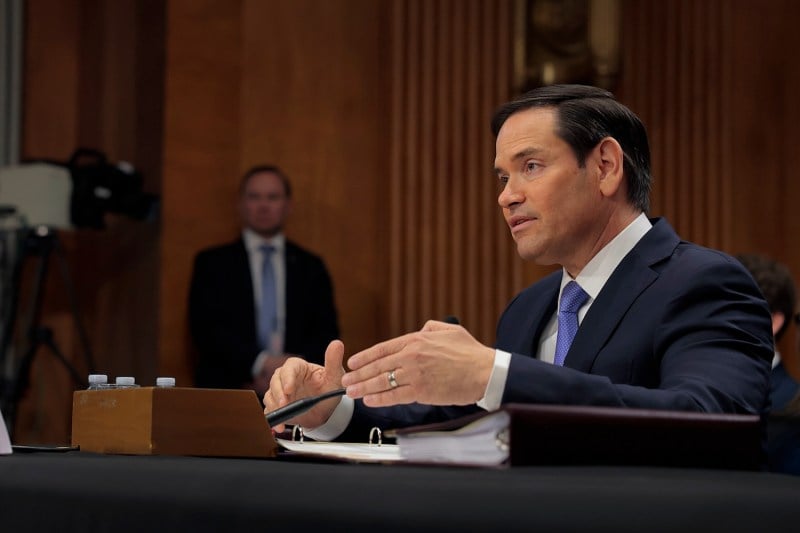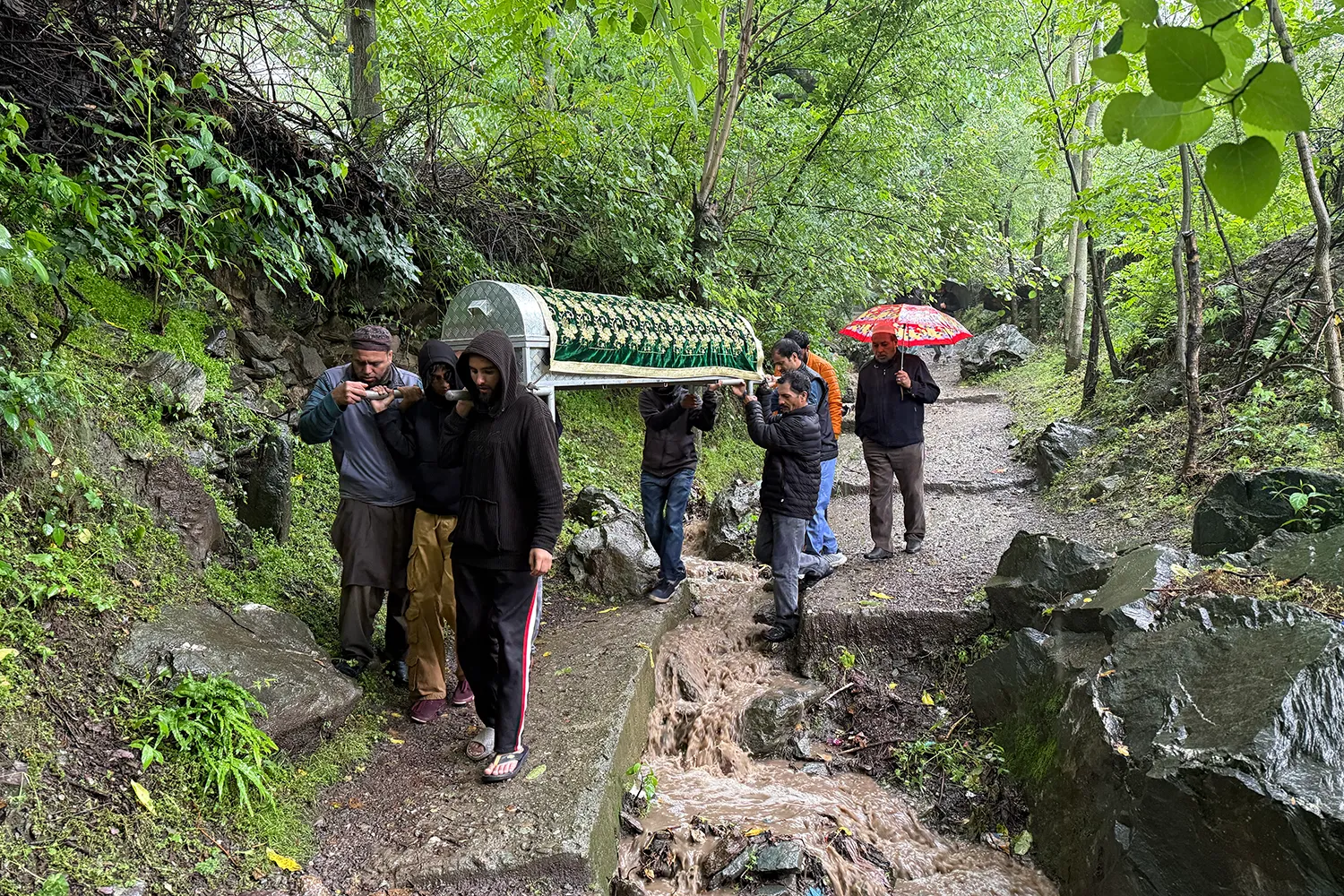Indonesians Take to Streets Against New Military Laws

Indonesians Take to Streets Against New Military Laws
Seemingly innocuous changes are a reminder of the past dictatorship.
Protesters are sprayed with water cannons by the police during a demonstration against a revision to the armed forces law, seen in front of the House of Representatives building in Jakarta, Indonesia, on March 27. Azwar Ipank/AFP via Getty Images)
Students are protesting across Indonesia—chanting slogans; skirmishing with police; and in one city, even throwing Molotov cocktails. The protesters are demanding the repeal of a law passed on March 20 that they say threatens to bring Indonesia back to the days of the military dictatorship that lasted from 1965 to 1998.
Even former President Susilo Bambang Yudhoyono, who was a general during the dictatorship era, has spoken out. “Don’t let ABRI” he said, referring to the dictatorship-era Armed Forces of the Republic of Indonesia, “now TNI/Polri [the modern military and police forces], repeat the past that has been corrected by history. We have to respect democracy, justice, freedom.”
Students are protesting across Indonesia—chanting slogans; skirmishing with police; and in one city, even throwing Molotov cocktails. The protesters are demanding the repeal of a law passed on March 20 that they say threatens to bring Indonesia back to the days of the military dictatorship that lasted from 1965 to 1998.
Even former President Susilo Bambang Yudhoyono, who was a general during the dictatorship era, has spoken out. “Don’t let ABRI” he said, referring to the dictatorship-era Armed Forces of the Republic of Indonesia, “now TNI/Polri [the modern military and police forces], repeat the past that has been corrected by history. We have to respect democracy, justice, freedom.”
On paper, the provisions of the law are far from dramatic: The legislation expands the list of civil service jobs that can employ military personnel. But with President Prabowo Subianto—a former special forces general who oversaw the kidnapping of dissidents in 1998 under the dictatorship—in office, the protests reflect a disquiet about a creeping remilitarization of government.
The key term in the argument is dwifunsgi, or “dual function.” Under the dictatorship of President Suharto, who came to power in a Western-backed military coup in the mid-1960s, As the dictatorship solidified its hold on power, Indonesia’s army declared that it had two roles: one military and the other sociopolitical.
The result was a military omnipresence as officers were appointed to seats in parliament, filled positions ranging from mayor to governor in provincial governments, took on powerful positions in the civil service and judiciary, developed substantial business interests, and played an active role in implementing government policies.
The start of democratization in 1998 resulted in the abandonment of the dwifungsi—and meant that even a hint of military officials holding other posts became seen as potentially dangerous. A law passed in 2000 forbade active military officers from holding any civilian positions. However, in 2004—shortly before the military finally abandoned its parliamentary seats—a new law clarified that the military allowed active-duty officers to occupy positions in 10 designated civilian institutions.
These ranged from the sensible, such as the Defense Ministry, the State Intelligence Agency, and the Search and Rescue Agency to the more eyebrow raising, such as the Supreme Court—the result of a messy compromise over the military court system.
This time around, the drama kicked off in mid-March, when parliament suddenly advanced a bill that had been first raised in 2023. Early drafts seen by experts would have permitted active-duty officers to take up positions in any institution at the president’s discretion in addition to giving officers the power to enter private businesses. This, plus secretive deliberations to rush the bill through the legislature, sparked the protests that culminated on March 15 with protesters storming the five-star Fairmont Hotel, where parliamentarians were meeting to discuss the bill.
The law that ultimately passed proved to be much milder. Six institutions—the border force, the disaster management agency, the anti-terrorism agency, the coast guard, the cybersecurity agency, and the Attorney General’s Office—were added to the list of civilian bodies that active military officers could serve in.
However, the protests—far from ceasing—have instead gathered steam since then. Many worry that the government has plans for further expansion, pointing to how the government has already pushed some officers into positions that they legally cannot occupy.
For some Indonesian experts, a limited law is a positive result.
“To be frank, I don’t see this as a big issue,” said Rizal Sukma, a senior fellow at the Center for Strategic and International Studies Jakarta, who helped draft the original 2004 law. “The previous draft was really concerning, as it said the military could list in these 14 positions ‘and other ministries according to the president’s wish’—that was dangerous. But it was excluded. The MPs themselves said this is not right, and they postponed it.”
With this new version, little has changed, he argued. Active-duty officers had, in fact, already served in all the institutions that were newly included in the amendment before it was passed. Various laws governing these institutions had allowed soldiers to assume positions within them, and the 2004 law was simply never updated to reflect this. Gray zones are common in Indonesia, but the revision means everything is now legally kosher.
Others, however, are much less sanguine. “Clearly, it is a militarization of the government,” said Usman Hamid, the executive director of the Indonesian branch of Amnesty International.
After the Fairmont Hotel was stormed, he was invited to the same hotel—by a government official who was reportedly keen to lower tensions—to discuss the bill clause-by-clause alongside other civil society leaders.
These rapid negotiations managed to bring about some positive changes before the final version passed a few days later, notably gutting a provision that would have allowed the military to conduct independent anti-drug operations.
Yet Hamid said that he was still worried, saying that any expansion of the military’s role undermines Indonesia’s democratic spirit. He also flagged a new clause on cyberdefense that could become a potential tool for censorship down the line.
Most of all, he felt that the parliament’s willingness to unanimously accept this, compared to the vigorous opposition from some parties in 2004, was an ominous sign.
“Indonesian democracy is experiencing more decline at the top level,” Hamid said. As he sees it, it has been the protesters, not parliamentarians, who have been guarding against remilitarization.
Even measured analysts worry that the law contributes to a long-running trend of “securitizing” government policy.
“The problem is not adding the number of institutions that TNI soldiers can sit in,” said former Lt.-Gen. Agus Widjojo, who also served as the deputy chairman of parliament from 2001 to 2003, holding one of the military’s seats. “But what is the limit?” he added. “Later it can expand, and expand, and expand.”
Governments, he said, are leaning on the military to adopt the role of “firefighters” when it comes to implementing policy.
The government also seems keen to increase the military’s role beyond what the new law allows. Those officers—holding positions such as the cabinet secretary and the head of state food distribution—look set to persist in these roles despite the recent revision making no allowance for this.
And in January, some 200 colonels were gathered and personally addressed by the president before being given crash courses in business to prepare them to assume positions in state-owned enterprises.
The military has also become deeply involved in the government’s signature push for food self-sufficiency, a program that has involved the introduction of free school meals for children. Army units have set up kitchens and prepare meals on military bases. They also appear to be involved in guarding and clearing land in Indonesian Papua in preparation for vast new “food estates.”
Even some supporters of the bill find these developments disturbing. One of them is T.B. Hasanuddin, a former major-general who now serves as a legislator for the Indonesian Democratic Party of Struggle, which is the only opposition party among Indonesia’s current government, and sat on the parliamentary committee that oversaw the revision of the bill.
“Yes, there’s a risk of militarization, but not because of the law,” Hasanuddin told Foreign Policy. “But there are activities that need to be corrected, like Bulog,” he said, referring to the state-owned enterprise that that stockpiles and distributes subsidizes foodstuffs like such as rice. He added, “When I was in the military, I trained to become a great soldier. For what? For fighting. Not for rice.”
Some analysts, though, worry that many officers are keen to take on an expanded role. Part of this is the simple fact that the military is top-heavy, with many officers occupying jobs with minimum responsibilities, creating pressure to find more meaningful positions for them.
But this tendency to look to expand the military’s remit has also been encouraged by former President Joko Widodo, who leaned on for political backing and to help execute policies, argued Muhamad Haripin, an analyst for defense issues at the National Agency for Research and Innovation.
“We had hopes, for example, that younger officers who rose post-Reformasi,” he said, referring to Indonesia’s period of democratization, “have a more progressive way of thinking, or maybe not progressive, but support the TNI as a professional force which is not politicized. But unfortunately, over time, we have not seen this.”
Even those who caution against alarmism admit that many in the military accept that dwifungsi is gone and see nothing wrong with taking on a broad remit beyond defense.
“They define ‘dwifungsi’ as involvement in politics, like being appointed members of parliament or running businesses,” said Sukma, of the Center for Strategic and International Studies Jakarta. “So, they say we’re not going back to do these things anymore. But we can do others. It’s multifungsi, they call it.”
Joseph Rachman is a freelance journalist covering Indonesia and other stories from around Southeast Asia. X: @rachman_joseph
More from Foreign Policy
-

An illustration shows a golden Cybertruck blasting through a U.S. seal of an eagle holding arrows and laurel. Is America a Kleptocracy?
Here’s how life could change for the rich, poor, and everyone in between.
-

The flag of the United States in New York City on Sept. 18, 2019. America Is Listing in a Gathering Storm
Alarms are clanging at the U.S. geographic military commands around the globe.
-

U.S. President Donald Trump shakes hands with Supreme Court Chief Justice John Roberts during Trump’s inauguration in Washington, D.C. The U.S. Judicial Crisis Is Uniquely Dangerous
But other democracies provide a roadmap for courts to prevail over attacks from the executive branch.
-

An illustration shows a golden Newtons cradle with Elon Musk depicted on the one at left and sending a globe-motif ball swinging at right. Elon Musk’s First Principles
The world’s richest man wants to apply the rules of physics to politics. What could go wrong?










Join the Conversation
Commenting on this and other recent articles is just one benefit of a Foreign Policy subscription.
Already a subscriber?
.
Subscribe
Subscribe
View Comments
Join the Conversation
Join the conversation on this and other recent Foreign Policy articles when you subscribe now.
Subscribe
Subscribe
Not your account?
View Comments
Join the Conversation
Please follow our comment guidelines, stay on topic, and be civil, courteous, and respectful of others’ beliefs.
Change your username |
Log out
Change your username:
CANCEL
Confirm your username to get started.
The default username below has been generated using the first name and last initial on your FP subscriber account. Usernames may be updated at any time and must not contain inappropriate or offensive language.